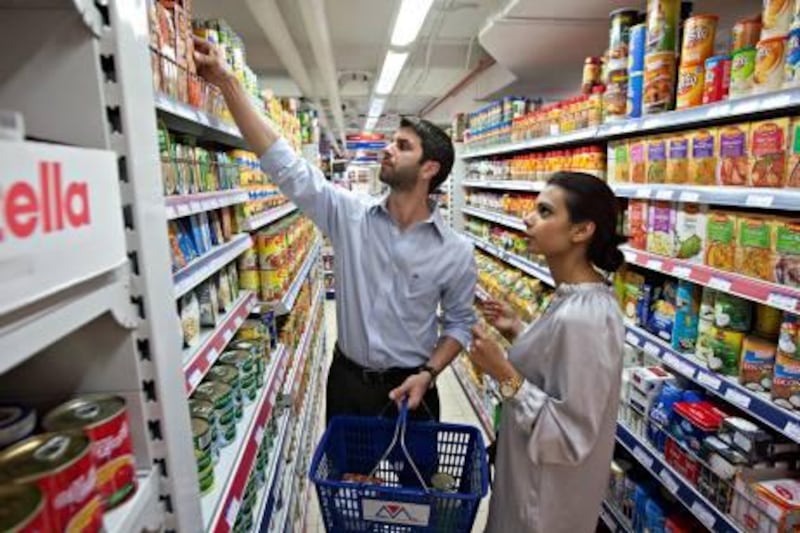While food has been getting steadily more expensive over the past decade, the increase has grown more rapid in the past year - and the vast majority of UAE residents have felt it.
Since 2000, the UN food price index, which measures commodities including, meat, dairy, cereals, sugar, and oils and fats, has rocketed from 90 to 237.
Juma Bilal Fairouz, the director of the UAE Consumer Protection Society, said residents were right to be concerned.
"The weekly bill keeps getting higher," he said. "My wife keeps experiencing high prices when grocery shopping and every type of food product has increased drastically."
He plans to raise the subject during a meeting with officials from the Ministry of Economy next week.
In the Al Aan TV survey, carried out by YouGov Siraj, Abu Dhabi residents were most likely to have felt the increase - 91 per cent said they had noticed food prices rising in the past year, against 88 per cent in Dubai.
The survey questioned 1,516 people from July 25 to 31.
Mr Fairouz suggested that the difference between cities could be the result of higher rents for shopkeepers in the capital.
Dita Mercidita, a 42-year-old Filipino mother of three, has been living in Abu Dhabi for eight years. She has found herself having to cut back at the supermarket.
"I usually buy a lot of food - rice, bread, meat, vegetables - for my three boys and I feel more and more shocked every time I get to the till to pay," she said as she picked up a couple of Dh30 fillet steaks.
"It's scandalous, we've come here to make and save money, and we find ourselves spending more by the day."
Mr Fairouz said there should be a proper regulation to monitor prices, and a study of traders' profits."I think prices should be brought down," he added.
The Ministry of Economy has been attempting to monitor food prices across the country. Last January, it announced plans to put in place an electronic tracking system this year to monitor the daily prices of 200 basic foodstuffs.
Meanwhile the increases have led many consumers to count their dirhams more carefully, with two in five (41pc) saying they spent less than Dh300 a week on food in shops - a figure Mr Fairouz describes as "very low."
Asked how big they felt the increases in the past six months had been, the most common answer (39pc) was between five and 10 per cent, although as many (40pc) put it higher, with nine per cent saying it had risen by more than 20 per cent.
Many residents (27pc) noticed the price of meat had increased the most, affecting a third of all Arab expatriates (31pc). "Meat has definitely increased in price," said Mr Fairouz.
The result for almost half (45pc) has been to buy less food in shops.
That makes sense, according to Mr Fairouz. "When you go to small shops, you usually buy what's for today only so you plan out your expenses more carefully there which is good," he said.
Two thirds (67pc) had noticed restaurant prices rising in the past six months. Of those, two in five suggested they had gone up by between five and 10 per cent.
"There's no control on the price of food in restaurants," Mr Fairouz said. And he said a consequence of the ministry's drive last year to stamp out the practice of adding service charges to bills in restaurants outside hotels (in hotels it remains legal) had been an increase in menu prices.
The result, according to half the people who said they had noticed price rises, was that most (54pc) ate out less often. Others (32pc) chose instead to order less or pick cheaper items.
"It's a wise decision to eat out less," Mr Fairouz said. "Instead of paying Dh200 for 1kg of meat, you can cook it at home for much cheaper.
"People go out for leisure and they must now learn to bring leisure at home."
Victoria Fitzgerald, a 50-year-old mother of four living in Dubai, said her outings with her husband have become less frequent in the past four months - they are going out for dinner dates once a month rather than every week.
"We used to go out to such nice restaurants at least once a week to take a break from work and the kids," she said. "But sometimes it's hard to keep up with these volatile prices."
Dana Shadid, a producer at Al Aan TV, said she was not surprised by the perception that prices had increased. And while she was, like most, happy with hygiene standards in restaurants, she noted that "cooking homemade meals is always the healthier and safer choice".






